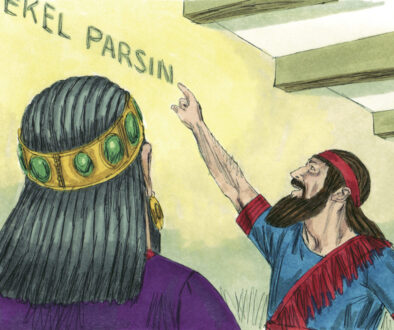Luke 12:13-21 Greedy Gus

Luke shares with us a unique story today. It sets the scene for one of Jesus’ better known teachings. This one starts with a cry from a member of the crowd.
I’m wondering if Jesus has been continuing on with the same crowd or if these lessons have simply been joined together by Luke because of similar settings. The man seeking Jesus’ input today isn’t following the theme of the last few lessons is why I’m wondering. What made him pose this request of Jesus? We don’t see anywhere else where Jesus took this form of requests or met this kind of “need.”
The story is set up by a man in the crowd asking Jesus to tell his brother to divide the inheritance with him. In the Jewish society only the oldest was entitled to the inheritance and birthright. The later children in the family may receive something too, but it was at the father’s discretion. This man, apparently the younger brother, had no rights to the inheritance. Jesus recognized what was in the man’s hear immediately; greed. Jesus told him that he was going to have to work it out on his own or take it before a judge. Jesus wasn’t going to get involved in a money squabble. But He saw a perfect opening for a lesson for all those listening in.
I want to walk in the footsteps of the rich man in Jesus’ story. We are going to put his land near a little town. In that town we will meet several people. One is Miriam who is a widow that sells homemade soap in order to feed her children. Another person we will meet is Levi who is a beggar who sits beside the town’s well. Levi used to be a carpenter before he fell from a ladder while building Joshua’s (the main character in our story) barns.
Joshua is a very rich man. He has the best of everything. His clothes are made to order and he has a different robe for each day of the week. His house is massive and has all the amenities of the time. He furnishes his home with custom made pieces imported from Tyre. His land includes fifteen acres of the richest fields in the region. It seems that everything he touches turns to gold.
But Joshua is not a happy man. His heart never seems to be satisfied. He finds fault in everything. His workers never work hard enough and they certainly don’t deserve the pay he gives them, so he makes sure to give them as little as possible. The goods in the market are not as fresh or as high a quality as they should be. The prices are too high so he haggles over every purchase.
Several years ago Jacob needed to increase his barn size. He had a bumper crop of wheat. He also bought new furniture and wanted a place to store the older pieces. He hired Levi and two other men from town as his carpenters. Joshua stood by and watched the men work every day. He would grumble that they were not working fast enough or he would complain because he didn’t think the work was being done correctly. Come payday he would dock their wages for time he thought they were wasting. Levi and his friends hated the way they were being treated but there was no other work in the area, so they endured Joshua’s behavior.
One day while Levi was finishing the roof of Joshua’s barn, Joshua began yelling for him to come down immediately. Levi hurried over to the ladder and began to descend. Joshua was rushing over to confront Levi, when he tripped and fell against the ladder Levi was on. Levi was knocked off the ladder and fell to the ground. Levi’s left leg was shattered. Joshua began berating him for his “clumsiness.” Levi’s partners carried him home where his wife tended him. Levi didn’t have any money for a doctor and Joshua refused to pay for one either. Levi’s leg would never be the same after that day. He was unable to work and longer and was reduced to begging. Joshua even docked the other men’s pay for the time it took them to carry Levi home.
Joshua is an influential man in the market place. He demands the highest quality at the lowest prices. Stall owners cringe when he comes to town. Their sales rise and fall with Joshua’s mention concerning their goods. Miriam comes every week with soaps she has painstakingly crafted. Her children’s bellies are filled only by the sales she makes or the trades she conducts. Joshua used to frequent her stall. He bought her soaps because of their fragrance and the fact that he could haggle her down to nearly nothing for her goods. Because Joshua found her soaps good enough for him, many other customers purchased from her too.
One week Joshua came into the marketplace and stormed over to Miriam’s stall. She could tell he was angry by the look in his eyes. As soon as he came near he began demanding a return of his money for the last soaps he had bought. He said they had caused him a rash and refused to buy from her again. Miriam didn’t know what to do. She couldn’t afford to return his money, even though he had not paid much for her goods. All her money was spent in feeding her children and buying supplies to create more soap to sell. Joshua became indignant when she told him this and began shouting. He yelled that she was a thief, that her products were dangerous, and that he would make it his personal mission to see that she never sold another inferior bar of soap in his town! Miriam’s business immediately dried up. Joshua always had the last word in this town. Miriam and her children were reduced to poverty. She gathered up what she could and moved herself and her children to a neighboring town to start again.
It’s been another bumper crop year for Joshua. His barns are already full. He holds out for the highest prices for his goods. He NEVER gives any of it away no matter what the need. Joshua decides that the only thing to do is build bigger barns. Rather than simply adding onto what he already has he decides to tear down his existing barns, one at a time of course, and replace them with bigger and better ones. THEN he will finally have enough, he thinks. First thing to do is find good, but cheap, laborers again.
Joshua goes to bed after drawing up his plans and having a good long talk with himself. He had decided that it was time to retire. He had everything he needed; money in the bank, overflowing barns, and plenty of anything else he could possibly want. Everything was his and his alone. He shared with no one.
That night God called Joshua to judgement. Joshua had spent his whole life looking after himself and no one else. Joshua was so busy building his empire that he never had time for a wife, children, or even God. He had amassed a fortune but there was now no one to enjoy it. His life was wasted. His “future” was left behind and he stood before God with nothing in his Heavenly account.
Jesus tells that Joshua was a “fool” and that anyone who only invest in this life is too. Jesus doesn’t say it is wrong to be wealthy but that this world’s wealth is meaningless unless it is used to enhance the Kingdom of Heaven. Invest in God’s people and His plans. Then your investment will be there when You meet up with Him in Heaven.
Father God, thank You for the finances You have given us. I know we are not rich by any means but what we do have I want to honor You with. Help me invest in Your Kingdom of my time, talents and finances. Show me where You want me to put each of these to best serve You. Forgive me for not giving freely all the time. Thank You for all those who have invested in me over my lifetime. Without their investment I don’t know where I would be. Please bless them for they have truly blessed me. I pray I have been half the blessing my parents have been.



